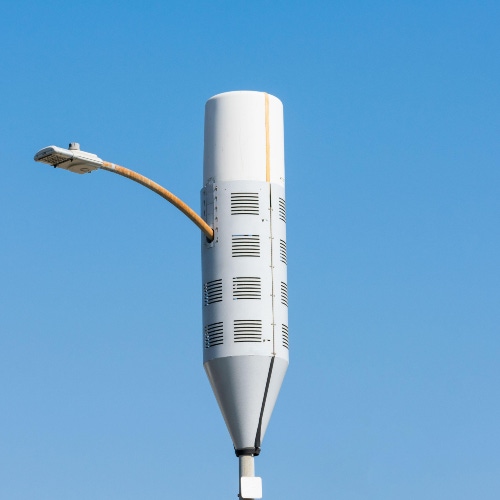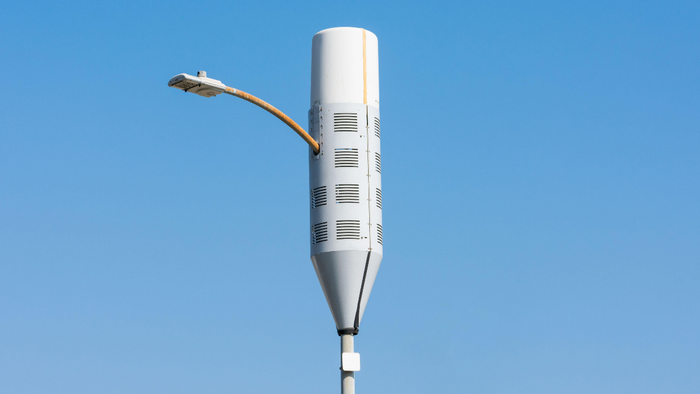
A new report from the Baltimore City Office of the Inspector General (OIG) found that hundreds of small cell sites in the city were not constructed to city specifications. As a result, the city's Department of Transportation (DoT) fined the company involved $477,000 for the violations.
However, the IOG's report does not name the company or companies that conducted the small cell installations. The agency did not immediately respond to questions on the topic from Light Reading.
A wide range of companies are involved in the US small cell industry. Further, those companies often work with local construction firms in order to physically construct new small cell installations. According to a 2019 report in the Baltimore Sun, AT&T, Verizon and Crown Castle were among the companies looking to install small cells in the city. Further, Crown Castle on its website boasts that it has installed over 500 small cell "nodes" in high-density parts of Baltimore, and plans to install an additional 583 locations.
After this article was published, Crown Castle acknowledged in a statement to Light Reading that it has had "some issues" with its small cell work in Baltimore, but that some of its "experiences" in the city were different from what's outlined in the city's report. "Crown Castle works closely with municipalities, utilities and contractors to follow established protocols and procedures when installing communications infrastructure," the company said in a statement to Light Reading. "Crown Castle completed restoration work in 2021 to address concerns raised by The City of Baltimore. This work was completed to the City’s satisfaction. We continue to value our longstanding relationship with the City of Baltimore."
Wireless Estimator, a publication that carefully tracks the US cell tower industry, reported that Crown Castle was the company that conducted the work outlined in the Baltimore report. The publication added that Baltimore will receive approximately $1 million in revenue during 2022 from Crown Castle under an agreement that expires in 2024.
Steps forward and back
Regardless, the issue helps to again shine a light on the difficulties that continue to dog the small cell market in the US. Small cells allow mobile network operators to "densify" their networks; the gadgets are essentially pizza box-size transmitters that often sit atop of light poles, rooftops and other so-called "street furniture."
Although small cells have been a hot topic in the US in recent years – some estimates pinned growth in the space rising from 86,000 small cells nationwide in 2018 to over 800,000 by 2026, accounting for 80% of future network deployments – there have been indications that big 5G operators in the US have pulled back from widespread small cell installations amid interest in deploying midband spectrum on bigger, macro cell towers.
Figure 1:  Small cells can sit atop light poles.
Small cells can sit atop light poles.
(Source: Michael Vi/Alamy Stock Photo.)
One issue dragging at small cells in the US is the difficulties and delays some companies encounter in navigating local installation regulations. Indeed, the issue is such that a controversial FCC ruling sought to smooth the small cell regulatory landscape at a federal level.
Nonetheless, there are clear indications that some companies have sought to bypass local regulations they view as burdensome. For example, the FCC in 2018 fined Sprint and small cell vendor Mobilitie a total of $11.6 million for not obtaining the proper permits to build small cells.
The OIG report from Baltimore regulators paints a similar picture.
Checking concrete
According to the agency's report, an anonymous tipster warned regulators that a company installing small cells in the city was just putting a thin layer of bagged, wet concrete on top of previously installed concrete to create the perception that it was adequately poured per city codes, which require five inches of new concrete atop any new installation.
"It was determined there are multiple small cell tower site restorations involving concrete or asphalt work completed by the Franchisee or Sub [subcontractor] #1 that do not adhere to city code requirements," the report noted, without naming any of the companies involved.
Interestingly, the report added that, during the COVID-19 pandemic, Baltimore's DoT stopped conducting on-site inspections of small cell installations due to staffing reductions. As a result, installation companies were simply required to send pictures of their installations for review. "Unless a concern about the results of a concrete/asphalt restoration project was brought to the attention of the DoT, there was no expectation or requirement for a DoT inspector to complete a follow-up inspection at a restoration site," according to the report.
"The OIG investigation substantiated the portion of the complaint regarding alleged shoddy concrete restoration work completed at a sampling of the Franchisee's small cell tower sites. As a result of the OIG investigation, the DoT conducted an independent investigation of all of the Franchisee's sites, including those in the OIG's sampling. The DoT determined approximately 450 sites where the Franchisee failed to restore those sites to DoT specifications. Subsequently, the DoT fined the Franchisee $477,000 for the violations," concluded the report.
Related posts:
— Mike Dano, Editorial Director, 5G & Mobile Strategies, Light Reading | @mikeddano
This article was updated on April 11 with new information from Crown Castle and Wireless Estimator.
About the Author(s)
You May Also Like












